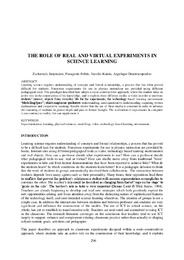The role of real and virtual experiments in science learning

View/
Date
2005Author
Smyrnaiou, ZacharoulaPolitis, Panagiotis
Komis, Vassilis
Dimitracopoulou, Angelique
Publisher
University of ZilinaPlace of publication
CY - ΛευκωσίαSource
CBLIS Conference Proceedings 2005 Integrating New Technologies in Science and EducationGoogle Scholar check
Keyword(s):
Metadata
Show full item recordAbstract
Learning science requires understanding of concepts and formal relationships, a process that has often proved difficult for students. Numerous experiments for use in physics instruction are provided using different pedagogical tools. The paradigm described here adopts a socio-constructivist approach, where the student takes an active role in the construction of his knowledge, and it exploits three different media: a video in order to motivate students’ interest; objects from everyday life for the experiments; the technology-based learning environment “ModellingSpace”, which emphasize qualitative understanding, semi-quantitative understanding, requiring written explanations and cooperative learning. Results shows that the use of three media is essential in order to advance the reasoning of students in greater depth and pass to formal thought. The realisation of experiments in computer is not contrary to reality, but can supplement it.
